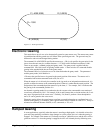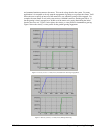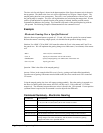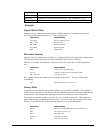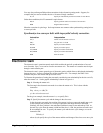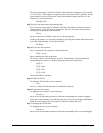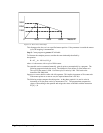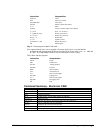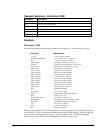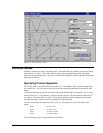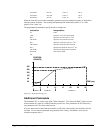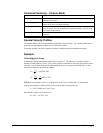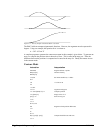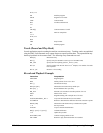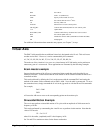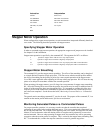
54 • Chapter 6 Programming Motion DMC-2X00
Operand Summary - Electronic CAM
command description
_EB Contains State of ECAM
_EC Contains current ECAM index
_EGa Contains ECAM status for each axis
_EM Contains size of cycle for each axis
_EP Contains value of the ECAM table interval
_EQx Contains ECAM status for each axis
Example
Electronic CAM
The following example illustrates a cam program with a master axis, C, and two slaves, A and B
Instruction Interpretation
#A;vl=0 Label; Initialize variable
PA 0,0;BGAB;AMAB Go to position 0,0 on A and B axes
EA C C axis as the Master for ECAM
EM 0,0,4000 Change for C is 4000, zero for A, B
EP400,0 ECAM interval is 400 counts with zero start
ET[0]=0,0 When master is at 0 position; 1st point.
ET[1]=40,20 2nd point in the ECAM table
ET[2]=120,60 3rd point in the ECAM table
ET[3]=240,120 4th point in the ECAM table
ET[4]=280,140 5
th
point in the ECAM table
ET[5]=280,140 6
th
point in the ECAM table
ET[6]=280,140 7th point in the ECAM table
ET[7]=240,120 8th point in the ECAM table
ET[8]=120,60 9th point in the ECAM table
ET[9]=40,20 10th point in the ECAM table
ET[10]=0,0 Starting point for next cycle
EB 1 Enable ECAM mode
JGC=4000 Set C to jog at 4000
EG 0,0 Engage both A and B when Master = 0
BGC Begin jog on C axis
#LOOP;JP#LOOP,vl=0 Loop until the variable is set
EQ2000,2000 Disengage A and B when Master = 2000
MF,, 2000 Wait until the Master goes to 2000
ST C Stop the C axis motion
EB 0 Exit the ECAM mode
EN End of the progra
m
The above example shows how the ECAM program is structured and how the commands can be given
to the controller. Figure 6.5 provides the results captured by the WSDK program. This shows how the
motion will be seen during the ECAM cycles. The first graph is for the A axis, the second graph
shows the cycle on the B axis and the third graph shows the cycle of the C axis.



